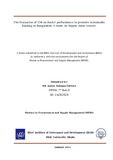| dc.description.abstract | Corporate Social Responsibility (CSR) has become a common issue for the business organizations of the world. It has become an important factor for the companies to do something good for the well being of the societies or surroundings where they belong to. Gradually many factors like supply chain sustainability as well as managing risk, adding value and benefit for stakeholder groups are coming forward concerning with CSR. A banking supply chain includes both the supply side and demand side elements that involves the end to end process of sourcing funds, managing those funds, disbursement of funds to, and collection from, customers. These activities can be conducted directly by the bank or indirectly through its intermediaries or agents. Like all other organizations banks also face cost and other challenges: some are predictable and some unanticipated. So Banks need to develop some strategies to navigate these challenges, like identifies hidden business costs, enhance its’ cash supply chain capabilities and improve productivity by uncovering organization’s insights that create opportunities for cost reduction, improving efficiency and mitigating risks–all without diminishing value. By thinking of cash as goods, banks can apply proven consumer business (CB) strategies to reduce excess inventory, lower handling and processing costs, improve operating efficiency and optimize the supply chain network of ATMs.
Financial institutions, such as banks, do not produce hazardous chemicals or discharge toxic pollutants into the air, land or water and thus apparently they might be viewed as uninvolved with environmental issues. But through their financing practices they are supporting commercial activity that ultimately degrades the natural environment. Again CSR is not just philanthropy and obeying the laws, rather an attempt to ensure their own sustainability and profitability. In Bangladesh The banking sector has a history of involvement in benevolent activities like donate to different charitable organizations, poor people and religious institutions, city beautification and patronize art & culture.
In this study twenty two private commercial banks have been chosen to find out the relationship between CSR & deposit amount, CSR & loan amount by evaluating last four years data. The study has given an interesting output. The output has shown that the relationship between CSR & deposits fits only 12% where the relationship between CSR & loans fits only 8%. So, it can be said that there is positive relationship between CSR & deposits, CSR & loans but the relationships are not strong enough. Brand trust is another important factor which can be affected by CSR expenses. In case of measuring brand trust, six phases of CSR- Employee Satisfaction, Social Phase, Ethical State, Legal Phase, Economic phase, Brand Trust and Environmental Phase has been used. If the CSR activities have been done properly then there are positive impacts on these six phases. To measure & compare the relationship between the brand trust & CSR expenses four banks has been chosen. Thirty employees from each bank (total 120) have been chosen randomly to find out their brand trust through questionnaire survey. From the comparison among four banks having the highest & lowest CSR expense in 2013, we can see that in every aspect or phases of CSR DBBL & IBBL have significant value than BCBL & NCCBL. In 2013 DBBL & IBBL have spent the highest amount in CSR where BCBL & NCCBL has spent the lowest. From the study we can see that in every phase there is a strong link between CSR expenses & brand trust or brand reputation. So, it is very much clear that CSR has a great impact on brand trust as well as brand value as the customers and employees believe the brand for its social responsibility nature. So from the study it can be said that as a tool of procurement and supply chain management CSR is quite efficient & successful in creating brand trust and reputation than increasing the amounts of deposits & loans.
Though the relationships between CSR expense & deposits, CSR expense & loans are not strong enough but by creating the brand trust the banks can bring an overall positive impact on the banks performance. So, the CSR activities should be used in a very much effective way with other important factors so that in near future CSR can have a significant impact on the overall supply chain of a bank in Bangladesh. | en_US |

